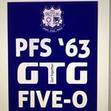Farouk Gulsara's Blog, page 25
June 5, 2024
Is space travel really a hoax?
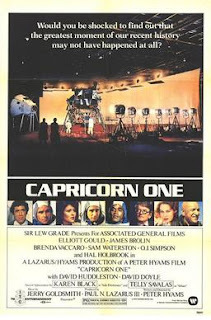 With the confidence of singlehandedly defending the motherland against the German soldiers in Operation Barbarossa in 1941 and essentially stalemating Hitler in the Führerbunker, Russians knew they were no pushovers. Stalin's forced post-war industrialisation efforts skyrocketed the Soviet Union into space exploration.
With the confidence of singlehandedly defending the motherland against the German soldiers in Operation Barbarossa in 1941 and essentially stalemating Hitler in the Führerbunker, Russians knew they were no pushovers. Stalin's forced post-war industrialisation efforts skyrocketed the Soviet Union into space exploration.
The Americans, coming out of World War 2 smelling of roses, after being able to turn the war around after their participation, felt they had to be numero uno. After all, after the Second World War, the US of A was the wealthiest nation around. On top of it, the war forced the migration of top scientists from Europe to America.
The 1960s saw rabid competition between leaders of the free world and the communist bloc to outdo the other in space exploration. The race intensified when the Soviets sent their first cosmonaut, Yuri Gagarin, to orbit the Earth in 1961. That spurred JFK to declare that America, the leader of the free world, would send a man to the moon by the decade's end. He asserted, 'We choose to go to the Moon in this decade and do the other things, not because they are easy, but because they are hard.' in 1962.
After the disastrous 1967 Apollo I fire, which killed all three crew members, their ability to send a man to the moon and back became suspect. So in 1969, when the USA suddenly announced to the world, with photos and TV transmissions, many sceptics insisted that the Moon Landing was staged in a studio here back on Earth. Flying a man in a tin can, forcing themselves out of the g-forces of Earth, and exposing themselves to deathly ionising radiation that encapsulated the planet was not humanly possible, in their minds. So, when this movie came out, I guess the Moon Landing deniers must be telling everyone, "I told you so!"
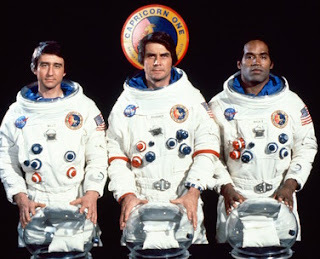 Even with the American space programme, funding was always the problem. The Indians later showed they could do all the Americans did for a fraction of their budget. That is another story. Safety was another issue. With the lack of fall-back backup, no rocket would be approved in the 21st century. What they did back then can be termed space charlatans today, promising more than they actually could.
Even with the American space programme, funding was always the problem. The Indians later showed they could do all the Americans did for a fraction of their budget. That is another story. Safety was another issue. With the lack of fall-back backup, no rocket would be approved in the 21st century. What they did back then can be termed space charlatans today, promising more than they actually could. Due to faulty supplies (as in the Apollo I mission), the life support system in Capricorn One was faulty. To avoid embarrassment, the Agency decided to fake their mission to Mars. The film shows, in a relatively poor execution of storytelling, direction, acting and script writing, how the world is hoodwinked into believing the journey is complete. In fact, the astronauts did not even leave the launch pad.
We see a relatively young James Brolin, Sam Waterson and O.J. Simpson in this 1977 film.
We have come a long way since the 1960s. Now, we are offering space tourism to the rich and high-heeled, just for the kick of it. If you do not mind burning a large hole in your wallet or the long waiting line, those interested should contact Elon Mask or Richard Branson.

 This work is licensed under a Creative Commons Attribution 4.0 International License.This work is licensed under a Creative Commons Attribution 4.0 International License.
This work is licensed under a Creative Commons Attribution 4.0 International License.This work is licensed under a Creative Commons Attribution 4.0 International License.
June 3, 2024
No ideal system
 The Hungarian Parliament House by the Danube at sunset
The Hungarian Parliament House by the Danube at sunsetThey did not know where they came from. They intelligently guessed they must have come from the Ural mountains around 800CE. No, say the archaeological finds. Excavations showed carvings and even scripts that go back 5,000 years!
Modern history tells them of Prince Stephen, the first devout Catholic King canonised posthumously.
People were happy going about their daily lives, leaving the administration to the monarch, whom they were programmed to believe God Himself ordained. They were glad to part with a portion of their hard-earned produce in return. After all, He decides whether the people should live, suffer, or die.
Soon, times turned for the worse. Other nations tried to dominate. People’s trust in the Divine soon dissipated. Then, Godless men steamrolled their ideology upon them. The communists preached equality and Utopia on Earth. It was, of course, another tale to outwink the unassuming.
They knew they had to rise. An uprising in 1956 was easily squashed by the mighty Soviet tanks. It was the status quo till the mighty dream of equality, as in other parts of the world, came tumbling down in by its own pompous weight.
Fed up with the single brand of soap and the Hobson choice of ugly-looking cars, they were enticed by the variety offered by capitalism's charm. They opened their borders for others to come in and learn about their heritage and how they made it as a race throughout their history.
 Hungarian Sunset
Hungarian Sunset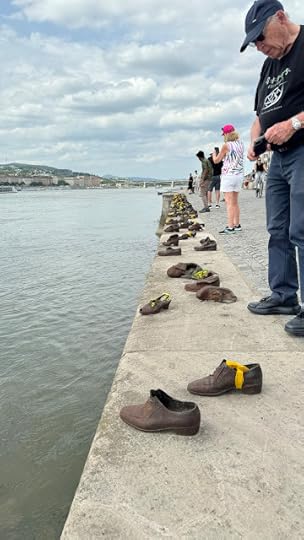 Remembering the gruesome end of captured Jewish
prisoners at the end of WW2. All were paraded by
the Danube, including children, to receive a bullet to
end their misery. Stone shoes to remember the incident.
Remembering the gruesome end of captured Jewish
prisoners at the end of WW2. All were paraded by
the Danube, including children, to receive a bullet to
end their misery. Stone shoes to remember the incident.
 A pensive moment by the Danube
A pensive moment by the Danube The site where Stalin's statue used to be. Was brought
The site where Stalin's statue used to be. Was brought down during the 1956 uprising. Stalin was replaced by God.
 Terror Museum @ Budapest. To remember the terror the Hungarians endured over the
Terror Museum @ Budapest. To remember the terror the Hungarians endured over the generations. Nothing black or white about terror. One man's terror is another man's law and order.
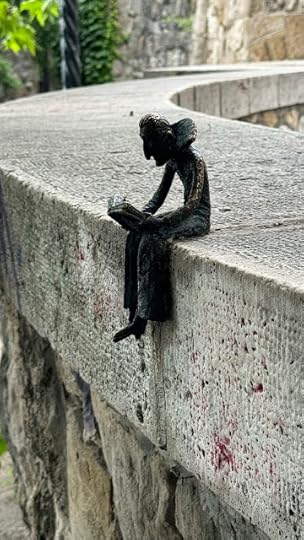 A repenting Dracula reading the Bible!
A repenting Dracula reading the Bible!One of the many mini statuettes around Budapest.
 Hero's Square commemorates the many fallen heroes,
Hero's Square commemorates the many fallen heroes,for the Crown, God and a piece of cloth @ a flag or
a piece of paper, maybe as an ID or passport!
 Stood still through it all! At King Saint Stephen's Basilica.
Stood still through it all! At King Saint Stephen's Basilica. The Marvel of Man and Engineering.
The Marvel of Man and Engineering.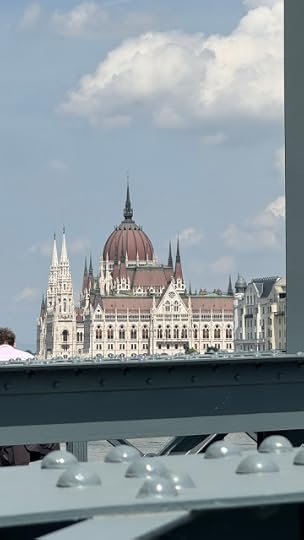
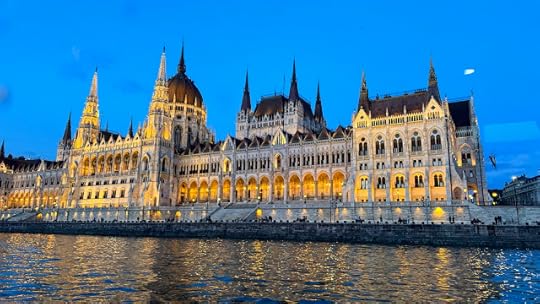
 Ordained by the Divine!
Ordained by the Divine!

 This work is licensed under a Creative Commons Attribution 4.0 International License.
This work is licensed under a Creative Commons Attribution 4.0 International License.
This work is licensed under a Creative Commons Attribution 4.0 International License.
May 31, 2024
Dictators don't die, neither do vampires!
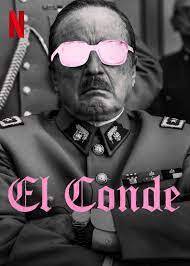 The first thing the viewers notice at the movie's start is the ‘fraktur’ fonts used in the opening credits. As we know, this font is linked to the Neo-Nazi movement, Germanness and possibly Hitler himself.
The first thing the viewers notice at the movie's start is the ‘fraktur’ fonts used in the opening credits. As we know, this font is linked to the Neo-Nazi movement, Germanness and possibly Hitler himself. This movie can be classified as a cruel comedy depicting past Chilean dictator Augusto Pinochet, not only in a bad light but one with no redeemable features. He is portrayed as a true-blooded 250-year-old vampire from the 18th century. He is said to have been born French as a foot soldier to King Louis XIV. Escaping from the hullaballoo surrounding the French Revolution, he scoots off with Marie Antionette's guillotined head. He ends up in Chile in the 1930s after much gallivanting.
Now, in the present time, after all the looting, killing and his trial, Pinochet wants to die, but he cannot as he is a vampire. He summons his wife and five children to a secluded island to plan his death. He, however, has an elaborate plan to fake his own death and start life anew elsewhere.
One of the children wants to know the total sum of his estate, so she brings in an accountant. The accountant's daytime job is being a nun, and she is hellbent on exorcising Pinochet. If this is complicated, wait until the nun falls for Pinochet and is bitten to be turned into a vampire. Pinochet goes bonkers for the nun.
During Pinochet's terror reign over Chile, he stayed that long because of his Anglophile friends. He defeated the socialist-minded Arrende, even though he was legitimately elected because the Americans did not want Soviet influence on Latin America. We know of Pinochet's help for Britain during the Falkland Wars.
Guess who comes to save the day? Margaret Thatcher. She is Pinochet's mother. Thatcher was a prostitute in King Louis XIV's Paris when she was raped and left her child at an orphanage after being bitten by a strigoi (spirit). It seems she cannot afford to lose her son's love. She comes to the rescue. They kill everybody and consume lots of young blood. Thatcher leaves with a very young Pinochet.
Lesson to learn: An autocrat is being groomed somewhere. The last dictator is not the last one, and neither is the next. Interestingly allegorical. The corrupt, violent dictators are like vampires; they do not die so easily and may be immortal, too.

 This work is licensed under a Creative Commons Attribution 4.0 International License.
This work is licensed under a Creative Commons Attribution 4.0 International License.
div class="separator" style="clear: both; text-align: center;">
This work is licensed under a Creative Commons Attribution 4.0 International License.
May 29, 2024
Another old profession - gossiping!
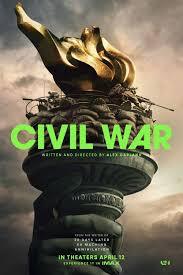 The world thought the USA's second Civil War was about to start when Donald Trump lost his second term in office. The Capital Building ambush by Trump's far-right supporters on 6th January 2021 was forever enshrined as the biggest desecration of the American democracy.
The world thought the USA's second Civil War was about to start when Donald Trump lost his second term in office. The Capital Building ambush by Trump's far-right supporters on 6th January 2021 was forever enshrined as the biggest desecration of the American democracy.In this movie version, it is sometime in the future when America is in a civil war. America is divided into areas controlled by regional militias and other extreme factions. The President is re-elected for a third term, and people are unhappy. There is mayhem in the country. Local vigilantes have taken control of most areas. In essence, it is like a war zone.
Amidst this chaos, two photojournalists have to travel by road across the country to Washington, DC, to interview the President. The film is about their experience of seeing America in a civil war.
 I was intrigued by the special privileges and status that journalists hold when they carry out their jobs in high-risk areas. The Geneva Convention has determined that they should be protected. Journalists have the right to report things as they see, as they are supposedly giving firsthand accounts of events. They are given special privileges to attend events deemed of public interest. Journalists are also protected from having to reveal the source of their information.
I was intrigued by the special privileges and status that journalists hold when they carry out their jobs in high-risk areas. The Geneva Convention has determined that they should be protected. Journalists have the right to report things as they see, as they are supposedly giving firsthand accounts of events. They are given special privileges to attend events deemed of public interest. Journalists are also protected from having to reveal the source of their information.As the world awakens from its long slumber, the question is whether the journalists' accounts of events are indeed the undeniable 'truth'? If schooling taught us anything, it told us that History lessons taught to us are testimonies written by victors. We are often fed with contradictory news in the immediate past and the present. It is expected to get many versions of what is happening in Ukraine, such as who is winning and who has more casualties. In the Israel-Hamas conflict, every journalist from either side paints a different picture of the situation on the ground.
Previously, the CCP insisted that Urghur Camps in Xin Jiang were reeducation centres, whilst many opposers of China insisted they were nothing like internment camps of dissidents.
Another thing that keeps cropping up is fake photos of victims in war-torn zones. It is often mentioned that many of the so-called 'victims' were paid actors who kept on appearing again and again at various disaster sites. An Afghani girl with amber-hued irises who emerged during the Russian invasion of Afghanistan was seen resurfacing during the Syrian civil war. Then, the tale of the walking corpse. I guess journalism had lost its professionalism and integrity.


 This work is licensed under a Creative Commons Attribution 4.0 International License.
This work is licensed under a Creative Commons Attribution 4.0 International License.This work is licensed under a Creative Commons Attribution 4.0 International License.
May 27, 2024
Another piece of Jewish history
 Old Charm of Prague @ Praha
Old Charm of Prague @ PrahaUnlike common assumption, Jews have been everyone’s bogeyman since time immemorial. They did not only endure torture under the hands of the Nazis alone. Throughout their existence, they have been subjected to much humiliation and suppression.
Even as early as the 10th century, the Jewish community was prominent in Czech lands. At one time, 20 per cent of the population of the land were Jewish and a good thing going. They were laborious, wealthy and could fend for themselves.
Unfortunately the stigmata of practicing Moses’ teachings made them an outcast. They were confined to a fenced quarter, picked from the most treacherous part of Prague. This was the most frequently flooded area that people kept away. They had to be identified with a yellow star badge of shame stashed on their tunics or to wear a yellow conical dunce hat for identification.
Even though some had become rich and one, at one instant, had become a federal minister and a philanthropist, he had to stay put in the ghetto-like living conditions in the Jewish quarters. They continued dogmatic religious rituals and a proscribed way of living.
 Jewish Ceremonial Hall
Jewish Ceremonial HallPrague
King Josef II of the Habsburg Empire decreed equality for all in the mid-19th century. He released the Jews from the quarters, but they continued living there because of convenience. Their happiness was short-lived. World War II marked another black dot in their lives.
Hitler’s Army, which marched effortlessly into Sudetenland, had one mission in hand, to free the world of Jews. Luckily for programmes like Kindertransport, many Jewish children were rescued and brought to the UK. Many Czech Jews were transferred to Theresienstadt Ghetto before being transferred to concentration camps for termination.
After WW2, the population of Jews in the Czech Republic dropped from 20% from the peak of times to the present less than 1%. Despite the dwindling numbers, their presence is immortalised by the constant mention in the visitor's brochures and occupies the go-to place for all tourists to the Republic. It currently occupies the most expensive piece of real estate in the whole of the Czech Republic.
 List of Israeli hostages by Hamas on 7.10.23
List of Israeli hostages by Hamas on 7.10.23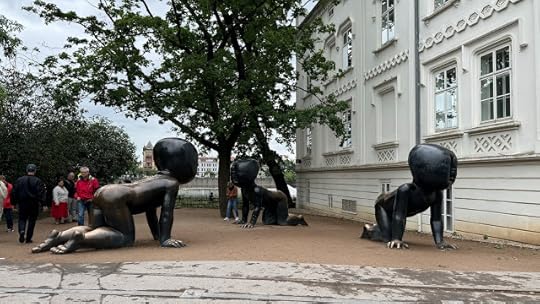 David Černy's Babies.
David Černy's Babies.In place of faces, he had barcodes. We are mere commodities.
 Imprisoned by the barrel?
Imprisoned by the barrel? Nothing astronomical about this astronomical clock.
Nothing astronomical about this astronomical clock.Sun revolves around the Earth? Old Town Square in Prague.
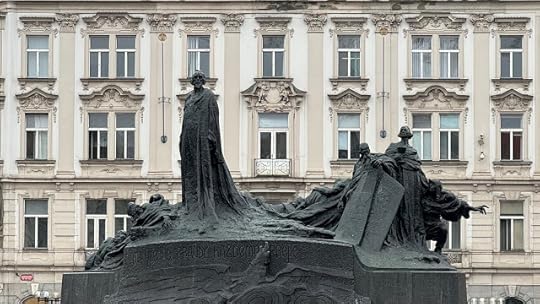 Jan Hus, part of the Bohemian Reformation, stood against the Catholic Church
Jan Hus, part of the Bohemian Reformation, stood against the Catholic Church a century before Martin Luther pinned his thesis on the Bishop’s door for all to read.
He was put at the stake for his (mis) deeds.
 Beaver on an American diet!
Beaver on an American diet!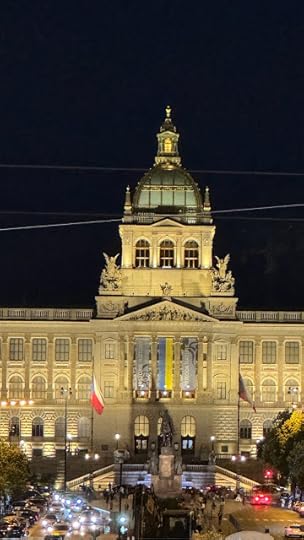 Prague National Museum
Prague National Museum Kafka was here! Born here!
Kafka was here! Born here! Spanish Jews built synagogue, Andalusian style.
Spanish Jews built synagogue, Andalusian style. Dancing Hall @ Prague
Dancing Hall @ PragueWith no single right-angle wall!
The building seems to be dancing, not for dancing!
 Lennon Wall @ Prague
Lennon Wall @ Prague
 This work is licensed under a Creative Commons Attribution 4.0 International License.This work is licensed under a Creative Commons Attribution 4.0 International License.
This work is licensed under a Creative Commons Attribution 4.0 International License.This work is licensed under a Creative Commons Attribution 4.0 International License.
May 26, 2024
The Survival Story
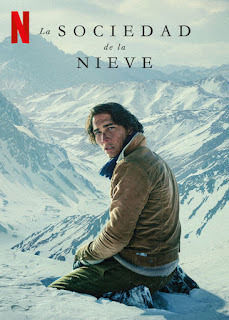
We have discussed this movie before. Check here.
This is yet another version depicting one of the greatest human stories about survival. On October 13, 1972, Uruguayan Air Force Flight 571 flew over the Andes from Uruguay to Chile. It was carrying 45 passengers on board, mostly Uruguayan rugby players. It crashed into the most inaccessible part of the mountain. Presumed to be dead by the authorities after failing to find them in their search-and-rescue, the 29 initial survivors were left to fend for themselves.
A few died due to their injury, and some in an avalanche that ensued. Exposed to the element and having no food to eat, they had to use the last of their survival skills, teamwork, and spiritual faith to hang on to their dear lives. When food became non-existent, somebody suggested that they eat the remains of the dead.
Initially, the passengers thought a rescue mission would ensue. After seeing planes just fly off and hearing on the radio sourced from the crashed plane that search-and-rescue missions had been called off, they became desperate. Caring for the injured, keeping themselves warm, getting food, and getting help were their immediate priorities.
The philosophical question of survival cannibalism played again and again amongst the survivors. On one hand, the thought of eating human flesh was repulsive. On the other hand, they were not killing another to eat them. They were merely consuming the cadaver, which will be consumed by creepy crawlies and bugs anyway. To put it to good use, like preserving the biggest asset to mankind, i.e. life, is worth it. Farm owners or cattle breeders are generally not too close with their flock, as they know their final destiny. Hence, on the flight, many of the deceased were known to each other. To eat the flesh of someone they knew must be in bad taste (pun unintended).
One of the survivors who refused to consume human flesh at all accounts succumbed, but he also had other physical injuries. Finally, the tenacious human spirit added with intelligence and a stroke of good luck or divine intervention*, two of them scaled mountains and ravines to finally get help.
The movie's final moments end with some sombre thoughts. The emotional trauma that the survivors must have endured must have been enormous.
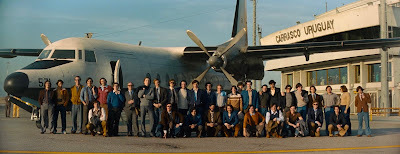 When it all started, cheery smiles!
When it all started, cheery smiles!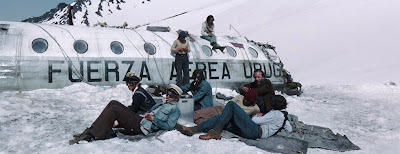 Out in the cold!
Out in the cold!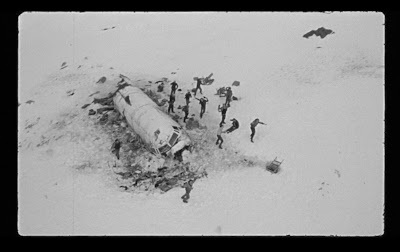 The actual footage during the final rescue in 1972.
The actual footage during the final rescue in 1972.* Does 'luck' or 'divine intervention' still play a role after all the passengers have gone through? It is natural to wonder whether it came too late.

 This work is licensed under a Creative Commons Attribution 4.0 International License.
This work is licensed under a Creative Commons Attribution 4.0 International License.This work is licensed under a Creative Commons Attribution 4.0 International License.
May 24, 2024
Any way the wind blows?
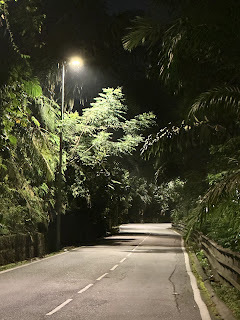 I have always wondered whether one should take sides in an argument when he is not the actually affected party. Being quite aware of Rashomon's effect of different perspectives on what actually transpired during an event, should anyone go all four barrels against the other just because one side is related to us?
I have always wondered whether one should take sides in an argument when he is not the actually affected party. Being quite aware of Rashomon's effect of different perspectives on what actually transpired during an event, should anyone go all four barrels against the other just because one side is related to us?We know we sometimes make our decisions rather prejudicially, guided by personal appearance, gender, common ethnicity or overt display of emotions by one aggrieved party, and the affected party is related to us. Still, when the push comes to the shove when our own kind is under the spotlight, where do you stand?
Is blood thicker than water, and do we support our flesh and blood no matter what? Do we drone down in support of loved ones, or do we go against the grain and take the side of where we think the truth lies?
What if the scandal happened within the family fold? Do we hush everything and sweep it under the rug? Still, there will come a time when a definite decision needs to be made. What do we do? Do we play two sides? Do we go with the flow to maintain peace or swim against the current to prove a point? What is the matter? Is something serious, something that could damage another's future or even criminal? Does protecting family honour supersede everything else?
*The Rashomon effect is a storytelling method in which the individuals involved give contradictory descriptions of the same event, thereby providing different perspectives and points of view of the same incident.
P.S. Tomorrow may rain, so I’ll follow the sun!🎶🎵©️

 This work is licensed under a Creative Commons Attribution 4.0 International License.
This work is licensed under a Creative Commons Attribution 4.0 International License.
This work is licensed under a Creative Commons Attribution 4.0 International License.
May 22, 2024
The new wave whodunnit
Silence 1: Can You Hear It?
Silence 2: The Night Owl Bar Shootout
Written & Directed: Aban Bharucha Deohans
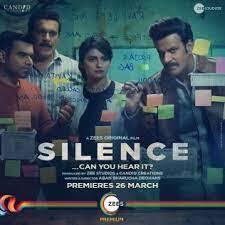
It is not easy to catch many whodunnit mystery dramas in Indian cinema. Most stories are too convoluted to follow or too outlandish to believe. Sometimes, the investigative officers are given superhuman capabilities and have to single-handedly swashbuckler or chase the villains to the conclusion. That is history.
With more exposure to police procedural TV shows and Hollywood offerings, audiences can no longer be fooled by this dated production. They are demanding more. With the advent of OTT platforms, it seems that newer, bolder, and more realistic scripts, sticking to real investigative police work, are on the menu these days. Many real-life crime dramas are shown as docuseries and movies. These two films with the same cast are fine examples.
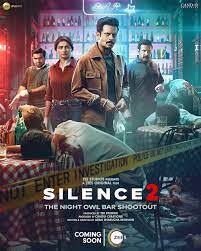 In Silence #1, a young lady is found dead with a gaping wound on her head by hikers at a popular hiking site. Novice sleuths or even crime drama addicts can sniff out the perpetrator at the word go. The storytellers decided to go somewhat meandering to trap this suspect. Of course, when this lead turned out to be a red herring, we knew it must be and turned out to be the second on the list anyway. Manoj Bajpai, who assumes the role of a disillusioned police investigator, keeps the plot together. There is a backstory to his frustration, which adds glitz to the whole affair.
In Silence #1, a young lady is found dead with a gaping wound on her head by hikers at a popular hiking site. Novice sleuths or even crime drama addicts can sniff out the perpetrator at the word go. The storytellers decided to go somewhat meandering to trap this suspect. Of course, when this lead turned out to be a red herring, we knew it must be and turned out to be the second on the list anyway. Manoj Bajpai, who assumes the role of a disillusioned police investigator, keeps the plot together. There is a backstory to his frustration, which adds glitz to the whole affair.As the first outing in Silence #2, Bajpai’s service in the particular unit, Special Crime Unit (SCU), is requested explicitly by VVIP. An important political figure is gunned down in a bar, and Bajpai is told to get to the bottom of it. Slowly, investigations take a tangent. It spins into a yarn of child prostitution and call-girl racket. The ending, however, turns out to be a whimper as the wrongdoer, after an elaborate execution of her whole crime, just admits to her heinous crimes so readily.
Still, it is an engaging one or two.

 This work is licensed under a Creative Commons Attribution 4.0 International License.
This work is licensed under a Creative Commons Attribution 4.0 International License.
This work is licensed under a Creative Commons Attribution 4.0 International License.
May 20, 2024
'Main character syndrome'?
Director: Weronika Tofilska & Josephine Bornebusch (Based on the autobiography of Richard Ladd)
 I learned a new term today: main character syndrome. In a world where only I, me and myself, which people really care about, it is logical for people to think that they are indeed at the centre of the Universe. The sun and all the planets revolve around them. They naturally become the main characters in a story they narrate. Even though the story is their point of view, it looks like the other characters are just there to fill up space without giving any substance to the story.
I learned a new term today: main character syndrome. In a world where only I, me and myself, which people really care about, it is logical for people to think that they are indeed at the centre of the Universe. The sun and all the planets revolve around them. They naturally become the main characters in a story they narrate. Even though the story is their point of view, it looks like the other characters are just there to fill up space without giving any substance to the story.This is what the other characters in this true story are saying.
This story is about a shy Scottish lad, Donny, who wants to be a comedian. It is an autobiography, actually. To sustain himself, he works as a bartender. In the course of his work, he meets a friendly lawyer whom he finds interesting.
He is not much of a comedian, really. He is not funny. Nobody laughs at his gigs. A TV scriptwriter takes Donny under his wing and promises to make him a star. The scriptwriter turns out to be a pervert who drugs him and rapes him.
Meanwhile, the lawyer he met at the bar turns out to be a stalker who goes to great lengths to make Donny's life a living hell. Donny has a transexual person for his girlfriend. The whole story is about how Donny emerges from the shadow of his past and handles his stalker to try to make something of his life. The trouble is that Donny appears drawn back to his past as if he enjoys the pain and lives to dwell in negativity.
Even though the storyteller tries to empathise with the stalker and the abuser, in biopics like these, the aggrieved party will have his own account of the whole event. So now, the stalker and the said abuser, which netizens can easily find out with all their wisdom, are thinking of taking legal action against Netflix for screening such a film. Unable to tell her version of what actually transpired during the whole fiasco, she accuses that writer of suffering from 'main character syndrome'.

 This work is licensed under a Creative Commons Attribution 4.0 International License.
This work is licensed under a Creative Commons Attribution 4.0 International License.This work is licensed under a Creative Commons Attribution 4.0 International License.
May 18, 2024
I spy... with my U-2!
Director: Steven Spielberg

The Second World War had ended. The Sun had finally set on the mighty British Empire. The post of world supremo was up for grabs. Over at the blue corner, secluded far away from powerful neighbours, the capitalist USA was the poster boy to prove the case that 'greed is good'. Meanwhile, at the red corner, the Soviet Union spread the idea of equity and condemned the Western way of life as decadent.
Riddled with secrecy and the zest to supersede the other regarding military supremacy and space explorations, the Soviet-US animosity reached mammoth proportions in the post-WW2 era. Each was spying on the other and trying to outdo the other. After witnessing the devastation that the mushroom clouds did to Hiroshima and Nagasaki, the Americans had the pressing need to keep nuclear bomb technology within American shores. On top of that, an even more devastating bomb in the form of hydrogen bombs was in the limelight. The Americans did not want the Russians to acquire that knowledge. They wanted to bring the whole world under their hegemony.
German scientists who absconded Nazi's harassment were rounded up for the Manhattan Project and other scientific explorations around WW2. They contributed much to American scientific prowess.
U2 planes could fly at an altitude of 70,000 ft. Flying at a specific speed, the Americans thought they could avoid detection. On May 1, 1960, equipped with a quality camera, a U2 plane left Peshawar on a reconnaissance mission to take high-quality photographs deep into the Soviet Union. Unbeknownst to the Americans, the Russians detected the plane and shot a missile at it. The plane went down.
Back in the USA, the American public was informed by NASA that their weather plane had crashed, killing its pilot, off the Turkey border. A fake NASA plane was shown as the ill-fated plane. The Soviets kept a tight lip about the whole incident.
 Francis Gary Powers
Francis Gary PowersSoon, Krushscoff made a statement that a US spy plane had crashed in their territory, and its pilot, Francis Gary Powers, was in their custody. This was a massive embarrassment to Eisenhower and his administration. Powers, it seems, was given the appropriate treatment as should be offered to a captured enemy, tried and sentenced to three years of imprisonment and seven years of hard labour.
That is where events related to this movie come in.
In 1960, Rudolf Abel (posthumously found to be a fake name) was caught as a Russian spy. The courts, wanting to appear to give a fair representation, appointed James Donovan, an insurance lawyer, to defend him. With the 1950 Rosenberg espionage trial and subsequent execution still in the American psyche, the public wanted blood. The Rosenbergs were accused of passing sensitive documents related to the Manhattan Project to the Russians. Amidst public admonishment and displeasure, Donovan gave Abel a fighting chance. Much to everyone's chagrin, Abel probably escaped the electric chair due to Donovan's pleas. He got 30 years imprisonment.
James Donovan's name came to the limelight again when the idea of prisoners swapping in 1962 popped up. The exchange was planned in West Berlin over Gleiniche Bridge, christened the 'Bridge of Spies' because many high-level deals were made here. As another side deal, an American student doing his PhD in Berlin was also released by the East German Stasi. For the record, the Berlin Wall was erected overnight in August 1961.
Rudolf Abel became one of Russia's most successful spies. After his release, he held important administrative and teaching positions in the Soviet Union.
(NB If you think the LTTE is cruel as their fighters carry cyanide-filled pendants to avoid capture and later interrogations, U2 pilots carry a deadly neurotoxin-impregnated needle hidden in a coin for them to inject themselves during instances when they cannot stand the torture of enemy. And the pilots barely passed twenty!)

 This work is licensed under a Creative Commons Attribution 4.0 International License.
This work is licensed under a Creative Commons Attribution 4.0 International License.This work is licensed under a Creative Commons Attribution 4.0 International License.

